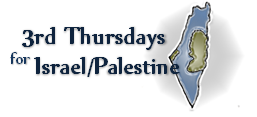3rd Thursday Action Alert: Tell Congress: No to annexation, and no to continued occupation
 Last Friday, May 15, Palestinians commemorated Nakba Day. “Nakba,” an Arabic word that means “catastrophe,” is how Palestinians describe what happened to them following Israel’s declaration of independence in May 1948 and the corresponding war. During the period, more than 500 Palestinian towns and villages were destroyed by the nascent Israeli state’s military, resulting in the forcible displacement and dispossession of more than 750,000 Palestinians from their homes and villages. Today, those still living and their descendants, comprise more than 5 million Palestinian refugees, whose rights of return and/or compensation for their losses as articulated in UN resolution 194 (1948) remain unfulfilled.
Last Friday, May 15, Palestinians commemorated Nakba Day. “Nakba,” an Arabic word that means “catastrophe,” is how Palestinians describe what happened to them following Israel’s declaration of independence in May 1948 and the corresponding war. During the period, more than 500 Palestinian towns and villages were destroyed by the nascent Israeli state’s military, resulting in the forcible displacement and dispossession of more than 750,000 Palestinians from their homes and villages. Today, those still living and their descendants, comprise more than 5 million Palestinian refugees, whose rights of return and/or compensation for their losses as articulated in UN resolution 194 (1948) remain unfulfilled.
With the 1967 War and resultant Israeli occupation of the West Bank and East Jerusalem, and occupation and current blockade of Gaza, Palestinians living in those territories have experienced further dispossession and dislocation, including the loss of land for settlement construction and expansion. Palestinians therefore refer to the “ongoing nakba,” which has meant a de facto appropriation of Palestinian land and property, and denial of their basic human and civil rights.
Last week, Secretary of State Mike Pompeo made an impromptu and fast visit to Israel, to discuss a variety of issues with Israeli leaders as a new government prepared to be sworn in. Annexation was among the topics of particular interest, as it has featured prominently in recent Israeli election campaigns, and is part of the Trump Administration’s proposal, “Peace to Prosperity,” which has been criticized by many church leaders. Israel has said that it can annex segments of the West Bank as soon as July. Such an Israeli de jure annexation in July would be devastating for any hopes for peace with justice for Palestinians and Israelis, and threatens to damage other relationships in the region, including Jordanian-Israeli peace.
While Israeli appropriation of Palestinian land and property is not new, the anticipated Israeli move would put a legal veneer on an act—illegal according to international laws, specifically the Fourth Geneva Convention—similar to Israel’s legislative acts to extend Israeli sovereignty over the Golan (1981) and occupied East Jerusalem (1980). In all cases, the inhabitants have not been given voice, and have been denied rights and privileges due to their national identification.
As the EU weighs possible responses, voices from the Middle East are clear: the Patriarchs and Heads of Churches in Jerusalem in their statement last week, expressed “the utmost concern” if Israel was to proceed with plans; and the Middle East Council of Churches and World Council of Churches issued a joint letter “appeal[ing] for a firm and principled stance by the European Union against any annexation [… which] would constitute a grave violation of international law.”
Click here to tell Congress that now is the time for the US to oppose Israeli annexation, and to make clear that the US will not continue to subsidize Israeli occupation and appropriation of Palestinian land, in contravention of international laws and conventions, and against established US principles and interests in the region.
If you prefer to send a letter by mail or email, please feel free to use the following suggested text if helpful in communicating with your elected officials:
Dear ….
It is with serious concern that I write to express my strong opposition to Israeli plans to annex segments of the West Bank, which according to international law, is occupied Palestinian land. On May 15, Palestinians commemorated 72 years since the Nakba (the “catastrophe”) in which they experienced the displacement and dispossession of land and property at the hands of the nascent Israeli state’s military. Today, the world watches as Israeli leaders of a newly installed government openly discuss the appropriation of land that Israel has occupied since 1967. Israel has never extended—and does not currently appear to consider extending—the rights and protections of legal citizenship to the Palestinian people over whom Israel’s sovereignty does and would extend.
As a person of faith, I write to urge you to oppose Israeli annexation, and to make clear that the US will not continue to subsidize Israeli occupation and appropriation of Palestinian land, in contravention of international laws and conventions, and against established US principles and interests in the region.
Fellow Christians in the Middle East, including the Patriarchs and Heads of Churches of Jerusalem, and the leadership of the Middle East Council of Churches, have been clear in their opposition to annexation. The Jerusalem church leaders wrote in their statement of May 7, 2020, that they view “such unilateral annexation plans with the utmost concern.” I echo their belief that Israeli annexation “would bring about the loss of any remaining hope for the success of the peace process.” I join the Jerusalem church leaders as they called upon the US and others “to respond to these unilateral annexation plans with a time-delimited and phased Peace Initiative in line with International Law and United Nations resolutions on the matter, in order to guarantee a comprehensive, just, and long-lasting peace in this part of the world that is considered Holy by the three Abrahamic Faiths.”
While there is still time, I urge you to use your good offices to oppose Israeli annexation, and to end Israeli occupation and appropriation of Palestinian lands.
Thank you for your consideration of this appeal.
Sincerely,
